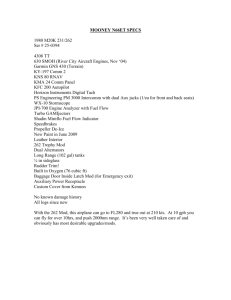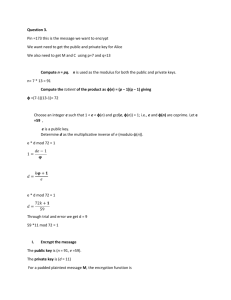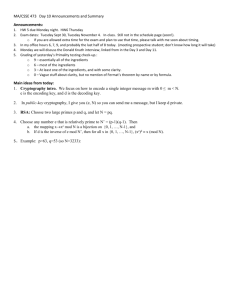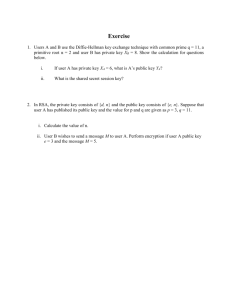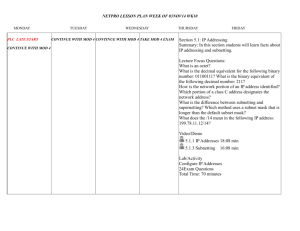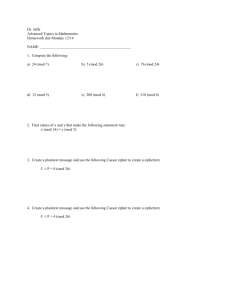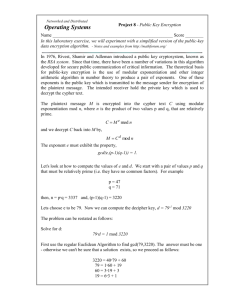RSA Algorithm Examples Solved with Euclidean Algorithm
advertisement
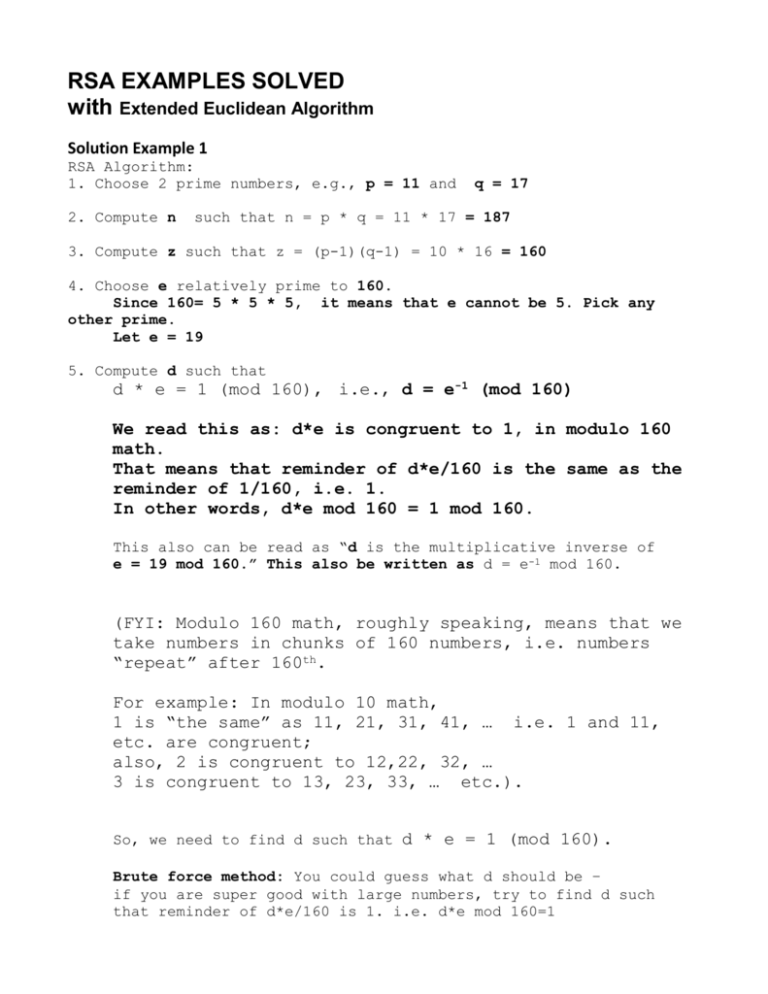
RSA EXAMPLES SOLVED with Extended Euclidean Algorithm Solution Example 1 RSA Algorithm: 1. Choose 2 prime numbers, e.g., p = 11 and 2. Compute n q = 17 such that n = p * q = 11 * 17 = 187 3. Compute z such that z = (p-1)(q-1) = 10 * 16 = 160 4. Choose e relatively prime to 160. Since 160= 5 * 5 * 5, it means that e cannot be 5. Pick any other prime. Let e = 19 5. Compute d such that d * e = 1 (mod 160), i.e., d = e-1 (mod 160) We read this as: d*e is congruent to 1, in modulo 160 math. That means that reminder of d*e/160 is the same as the reminder of 1/160, i.e. 1. In other words, d*e mod 160 = 1 mod 160. This also can be read as “d is the multiplicative inverse of e = 19 mod 160.” This also be written as d = e-1 mod 160. (FYI: Modulo 160 math, roughly speaking, means that we take numbers in chunks of 160 numbers, i.e. numbers “repeat” after 160th. For example: In modulo 10 math, 1 is “the same” as 11, 21, 31, 41, … i.e. 1 and 11, etc. are congruent; also, 2 is congruent to 12,22, 32, … 3 is congruent to 13, 23, 33, … etc.). So, we need to find d such that d * e = 1 (mod 160). Brute force method: You could guess what d should be – if you are super good with large numbers, try to find d such that reminder of d*e/160 is 1. i.e. d*e mod 160=1 So try all multiples of 19 until you find one that that works. d=1: 19 mod 160=19 is not 1, so d=1 doesn't work d=2: 38 mod 160 = 38 d=3: 57 mod 160 = 57 so it's not worth checking d's less than 8. d=9: 178 mod 160 = 18 so d=9 won't work d=10 190 mod 160 = 30 d=11 … keep on going until you find d=59. Good luck! d can have a large value. There is another, shorter, brute force methods, thanks to Zack: d = (z+1)/e but only if the result is whole. So, try to find multiples of z that give a whole number when added 1 and divided by e. It is shorter than the above brute force method. d= (1*160+1)/19 is not whole (2*160 +1)/19 is not whole (3*160 + 1)/19 … finally 7*z gives result d=59. ExcelExampleBruteForce e z d=(z+1)/e 19 160 1 2 3 4 5 6 7 8.47 16.89 25.32 33.74 42.16 50.58 59 It might be easier to use the Extended Euclidean Algorithm to compute value for d. See solution details below. It turns out that: d = 59 Check: 19*59mod 160 = 1121 mod 160 = 1 1 mod 160 = 1 So yes, d*e = 1 (mod 160). Therefore: Public key = (e, n) = (19, 187) Private key = (d,n) = (59, 187) 6. Encrypt the message After we calculated the keys, the only thing left to do is to encrypt the message. Convert each character of the message into ASCII equivalent, and split the message into blocks of digits. Take the numerical value of each block, let’s call its value PB, and encrypt each plain block PB using formula: encrypted(PB) = PB^e mod n. Decrypt cyphered block CB using formula: decrypted(CB) = CB^d mod n. Let’s assume that we are trying to encrypt message which has ASCII representation of 001002. (I made it up to keep it simple). Let’s say we break the message into blocks of 3. So the blocks are 001, 002. So, the cyphertext is 001 127: 00119 mod 187 = reminder of 119 / 187 = 1 00219 mod 187 = 127 Now let’s decrypt 001 127. Again, we take the blocks of 3: 00159 mod 187 = 001 12759 mod 187 = 002 EUCLIDIAN ALGORITHM IN DETAIL: Extended Euclidian Algorithm fits numbers into this Pattern: Reminder = * Extended Euclidean Algorithm Example for e = 19, z = 160 Start from the top, from z and e: 160/19 = 8 R=8 8 = 160 * 1 - 19 * 8 (step 1) 160 is the square, 19 is the triangle, 8 is circle, 8 is star Now fill in the same “starry” pattern, but this time plug in different values: put the current value of the triangle(i.e. 19) into the square; and put the current value of the star (i.e. 8) into the place of triangle. 19/8 = 2 R=3 3 = 19 - 8 * 2 (step 2) 19 is the square, 8 is the triangle,2 is circle, 3 is star Keep on doing this same thing until you reach reminder=1: 8/3 = 2 R=2 2 = 8 - 3 * 2 (step 3) 3/2 = 1 R=1 1 = 3 - 2 * 1 (step 4) Now try 8 = 3 = 2 = 1 = try to make all remainders look like a combo of 160 and 19, i.e. to make them look like: 160* __ + 19* ___ 160* __ + 19* ___ 160* __ + 19* ___ 160* __ + 19* ___ You could guess what values to put in! If you are good with large numbers, go ahead. However, it might be a little too time consuming. It is easiest to get this done if you substitute expressions which have 160 and 19 in them already. So – start from 8 and keep on substituting. Applying the Extended Euclidean Algorithm to make appropriate substitutions, we get: 8 = 160 - 8*19 (step 1) 3 = = = = 19 – 2*8 19 – 2(160 – 8*19) 19 – 2*160 + 16*19 -2*160 + 17*19 (step 2) (substitution for 8) (algebraic simplification) (simplest form) 2 = = = = 8 – 2*3 (160 – 8*19) – 2*(-2*160 +17*19) 160 – 8*19 + 4*160 - 34*19 5*160 – 42*19 (step 3) (substitution for 8 and 3) (simplify) (simplest form) 1 = = = = 3 – 1*2 (-2*160 + 17*19) – (5*160 – 42*19) -2*160 + 17*19 – 5*160 + 42*19 -7*160 + 59*19 (step 4) (replace 3 and 2) (simplify) (simplest form) This means that d = 59 is the multiplicative inverse of e = 19 mod 160, which can also be written as 59 = 19-1 mod 160 The public key is (e, 187) = (19, 187) The private key is (d, 187) = (59, 187) Extended Euclidean Algorithm Solutions Example 2 Choose 2 prime numbers, e.g., p = 47 and q = 71 Compute, n = p * q = 47 * 71 = 3337 Compute, z = (p-1)(q-1) = 46 * 70 = 3220 Note: p-1 = 46 = 2 * 23, q-1 = 70 = 2 * 5 * 7 Choose e relatively prime to 3220 e = 79 which does not contain any common factors with p-1, q-1 Compute d such that d * e = 1 mod 3220, which can be written as, d = e-1 mod 3220 By Extended Euclidean Algorithm, determine that d = 1019 Public key = (e, n) = (79, 3337) Private key = (d,n) = (1019, 3337) Extended Euclidean Algorithm Example for e = 69, z = 3220 3220/79 79/60 60/19 19/3 = = = = 40 R 60 1 R 19 3 R 3 6 R 1 => => => => 60 = 3220 - 79 * 40 19 = 79 - 60 * 1 3 = 60 - 19 * 3 1 = 19 - 3 * 6 (step (step (step (step 1) 2) 3) 4) Applying the Extended Euclidean Algorithm, we get: 60 = 3220 - 40 * 79 (step 1) 19 = = = = 79 - 1 * 60 79 - 1*(3220 – 40*79) 79 - 3220 + 40*79 -3220 + 41*79 (step 2) 3 = = = = 60 - 3*19 (3220 - 40*79) - 3(-3220 + 41*79) 3220 – 40*79 +3*3220 -123*79 4*3220 – 163*79 (step 3) 1 = = = = 19 – 6*3 (-3220 + 41*79) – 6(4*3220 – 163*79) -3220 + 41*79 -24 *3220 + 978*79 -25*3220 + 1019*79 (step 4) The final equation means that d = 1019 is the multiplicative inverse of e = 79 mod 3220, which can also be written as 1019 = 79-1 mod 3220 The public key is (e, 3337) = (79, 3337) The private key is (d,3337) = (1019, 3337)

